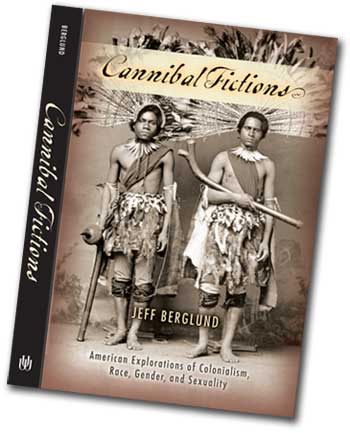The thought of humans eating humans is a macabre image most people avoid, but notJeff Berglund, who explores the facts and fictions of cannibalism in his new book,Cannibal Fictions, American Explorations of Colonialism, Race, Gender, and Sexuality.
Berglund, an associate professor in the English Department at Northern Arizona University, is interested in understanding why writers, through the centuries, have continued to focus on the subject of cannibalism.
He wrote the book because he was “troubled by the recurring references in literature to extreme barbarity ascribed to indigenous people,” he said. “I was particularly intrigued by the accusations of cannibalism in cultures where it is not a common occurrence.”
Berglund examines how fictional narratives about the subject not only made their way into popular entertainment, such as in P.T. Barnum’s “Fijian Cannibals” exhibit in the 1870s, but how hyperboles and fears about the fascinating subject shaped “perspectives about various cultures and even nations.”
“This book is a study of fictional works as well as representational practices that package the truth about cannibalism,” Berglund said.
From the historic Donner Party, to Edgar Rice Burroughs’ Tarzan of the Apes, and Fannie Flagg’sFried Green Tomatoes, Berglund serves up a collection of cultural texts and references that demonstrate how the treatment of cannibalism has led to racism and sexism.
“The subject of cannibalism is malleable and potent enough that it will inevitably continue to be revitalized in newer works of fiction,” Berglund said. He points to the popularity of the subject in works such as Thomas Harris’ Silence of the Lambs and the newest installment of The Pirates of the Caribbean.
After looking at cases further back in time, Berglund concludes his discussion by examining contemporary Native American perspectives in writing by Sherman Alexie, Gerald Vizenor, Leslie Marmon Silko, and Anna Lee Walters.
Since completing this project, Berglund has increasingly focused on literature by American Indian writers. Currently he is finishing a book about the Navajo Long Walk (1864-1868), and how it has been recorded and remembered.
Berglund, associate chair of the NAU English Department, teaches cultural studies, American literature, American Indian literature and narrative, contemporary literature and multi-ethnic literature. He chairs the university’s Liberal Studies Committee. Cannibal Fictions was published by the University of Wisconsin Press, in August 2006.



